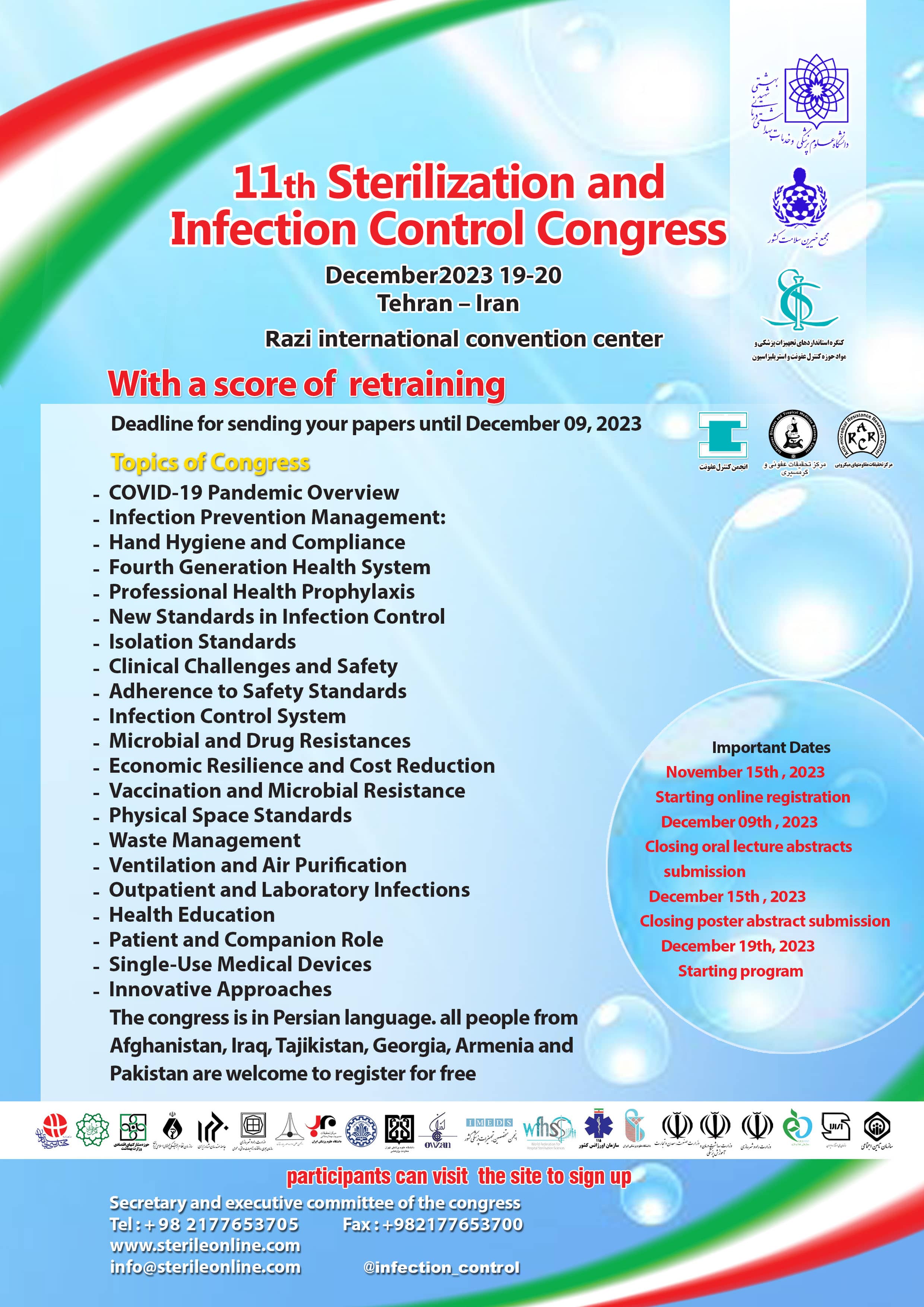محورهای کنگره
محورهای دوازدهمین كنگره تخصصی استانداردهای تجهیزات پزشکی و مواد حوزه کنترل عفونت و استریلیزاسیون:27و 28آذرماه 1403
- ارایه دستاوردها و تجربیات پاندمی کووید 19 ، ظرفیت های”مقررات بین المللی بهداشتیIHR”
- (مراقبت بسته ای) در پیشگیری از عفونت های بیمارستانی” Bundle Prevention Management “
- بیماریهای نوپدید و بازپدید و نظام مراقبت سندرمیک
-
پیشگیری و کنترل عفونتها در دندانپزشکی
- کنترل عفونت، استریلیزاسیون مرکزی، تجهیزات پزشکی و بهداشت در نسل ششم اعتباربخشی ملی
- سلامت حرفه ای ، پروفیلاکسی بعد از مواجهه شغلی در کارکنان خدمات سلامت و احتیاطات استاندارد
- هماهنگی بین بخشی(حوزه های درمان، بهداشت، پرستاری، غذا ودارو، آموزش)درارتقاء استانداردهای پیشگیری وکنترل عفونت
- استانداردها و دست آوردهای جدید مرتبط با مواد وتجهیزات پزشکی حوزه کنترل عفونت و احتیاطات مرتبط
- استانداردهای ایزولاسیون درکنترل عفونت باتاکید براتاق های ایزوله فشارمنفی وبیماران بانقص سیستم ایمنی
- کاربرد ایمن مواد ومحلولهاي ضدعفوني كننده و چالشهای بالینی مواد و تجهیزات مصرفی
- ایمنی بیمار، مراجعین و کارکنان و نقش همگرایی استانداردهای ایمنی بیمار
- نظام مراقبت عفونت های بیمارستانی و پیشگیری و کنترل عفونتهای ناشی از ارایه خدمات سلامت
- مقاومت های ميكروارگانیسمی ودارویی ونقش کمیته استوارد شیپ درکنترل آن با تاکید بر بخشهای ویژه
- نقش کنترل عفونت و برون سپاری خدمات مرتبط در اقتصاد مقاومتی و کاهش هزینه های بیمارستانها،چالشها و راهکارها
- واکسیناسیون ، استراتژی نوین پیشگیری از مقاومت میکروبی
- استانداردهای فضای فیزیکی و کنترل عفونت در واحدهای استریلیزاسیون مرکزی ، اتاق عمل ،رختشویخانه ، آشپزخانه های صنعتی
- مدیریت فاضلاب ، سیستمهای تصفیه فاضلاب، مدیریت پسماند و بی خطرسازی پسماندهای عفونی
- سیستمهای تهویه وتصفیه و ضدعفونی هوا و تولید و توزیع گازهای طبی
- پیشگیری وکنترل عفونت درمراکز ارایه خدمات سرپایی، دندانپزشکی وآزمایشگاههای تشخیص طبی وتحقیقاتی عفونی
- آموزش بهداشت و نقش بیماران و همراهان در کاهش عفونتهای بیمارستانی
- وسایل یک بارمصرف پزشکی واستانداردهای فرآوری مجدد ایمن وسایل پزشکی
- رویکردهای نوین در کنترل عفونت با استفاده از فناوری و پردازش اطلاعات
– COVID-19 Pandemic Overview:
– Presentation of achievements and experiences.
– Emphasis on International Health Regulations (IHR) capacities.
– Infection Prevention Management:
– Bundle Prevention Management for hospital infections.
– Syndromic care systems in hospital emergency units.
– Hand Hygiene and Compliance:
– Importance of hand hygiene (Hand Rub Surgical and Preparation).
– Measurement of compliance and related equipment.
– Fourth Generation Health System:
– Infection control, central sterilization, and medical equipment.
– National accreditation and the health system transformation plan.
– Professional Health Prophylaxis:
– Post-occupational exposure for healthcare workers.
– Coordination across healthcare sectors (treatment, nursing, nutrition, and drugs).
– New Standards in Infection Control:
– Materials and medical equipment standards.
– Precautions related to infection control.
– Isolation Standards:
– Emphasis on isolated rooms with negative pressure.
– Considerations for patients with immune system deficiencies.
– Clinical Challenges and Safety:
– Application of safe disinfectants.
– Clinical challenges of consumables.
– Adherence to Safety Standards:
– Patient, visitor, and staff adherence to safety standards.
– Infection Control System:
– System for preventing and controlling infections resulting from healthcare services.
– Microbial and Drug Resistances:
– Understanding resistances and the role of accreditation committees.
– Economic Resilience and Cost Reduction:
– Role of infection control and outsourcing in economic resilience.
– Challenges and solutions for reducing hospital costs.
– Vaccination and Microbial Resistance:
– Importance of vaccination in preventing microbial resistance.
– Physical Space Standards:
– Standards for physical space and infection control in various units.
– Waste Management:
– Management of sewage, wastewater, and infectious waste.
– Ventilation and Air Purification:
– Systems for ventilation, air purification, and medical task distribution.
– Outpatient and Laboratory Infections:
– Prevention and control of infections in outpatient dental care and laboratories.
– Health Education:
– The role of health education.
– Patient and Companion Role:
– Role of patients and companions in reducing hospital infections.
– Single-Use Medical Devices:
– Importance and standards for single-use medical devices.
– Innovative Approaches:
– Innovative approaches in infection control using technology and information processing.










